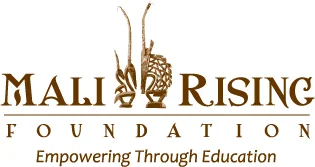By Hindaty Traore, Girls’ Project Manager
Young people in Mali face many challenges, particularly if they are female. Education helps girls (and boys!) by providing them options for their future, but sometimes the traditional route to unemployment is barred. That’s why the Girls’ Project encourages young women to think creatively about their career options.
To help girls think creatively about their future, one of the themes we cover in our Girls’ Group is entrepreneurship and self-sufficiency. The goal is to have the girls come up with ideas that will allow them to start a business if they cannot find a job after graduation. Although some girls will go on to more traditional jobs, the reality is that Mali’s civil service and local authorities are proving incapable of absorbing the population seeking employment.
Girls discuss their ideas for possible future small businesses they could use to be independent and empowered.
Our discussions help the girls understand that they have options even if a traditional job is hard to find. I lead the girls in discussion about the labor market and then the girls brainstorm ideas for their own businesses.
Seventen-year-old 9th grader Salimata D. from Ross and Malilou Moser Middle School in Nieguenkoro provides an example of the thinking our girls generate. Salimata’s parents' work does not bring in much money and she is the eldest child, which is why she wants to finish her studies quickly and help her parents with income.
Salimata is a determined girl who would like to show her parents that being a girl doesn't just mean marriage or a being housewife -- a girl can also take care of her parents and take care of family expenses. Salimata was studying at a different school, but failed the graduation exam twice. She then decided to come and study at Nieguenkoro this year because – thanks to Mali Rising’s donors – this school has books that the students can use while in her old school there were no books. Before coming, she also heard that there was a project that supports girls. All these things attracted Salimata to come and study in Nieguenkoro.
“My father didn't want me to continue studying because to him it's a waste of time. He tells me that all the girls my age are already [married and] in their homes. I promised him that this year, I will do everything possible to succeed because there are every means in this school for me to succeed,” says Salimata.
Salimata continues, “After graduation, I would like to train as a nurse to serve in my village. In our health center, there is only one lady there to serve as a nurse while there are many patients. This is why I want to be a nurse. I would like to do a short course because I am afraid of being forced to leave school without completing my studies due to marriage.”
Salimata is a regular attendee at our Girls’ Group meetings and seems to really benefit from the curriculum. She told me, “I am very happy today to have learned a lot of things during our meeting which was on “Independence of girls after studies or self-sufficiency.” I didn't know that it was difficult to find a job even with a diploma. I really appreciated this theme because it gave me an idea that without working with my diploma, I can think about strategies to be independent and above all have a source of income. The idea I had was to produce and sell shea butter differently from what our mothers usually do (who sell by the kilo in the village).:
When asked what was different about her idea, Salimata said, “Usually during the rainy season, we girls pick a lot of shea nuts then we transform them into shea butter ourselves and sell it by the kilo in the markets, but we don't earn much. This time through this theme, I have the idea of modernizing and personalizing with pretty boxes and labels on them. I could even look for customers on social networks to sell them even to strangers. Shea butter is widely used for its benefits.”
Another student talked with me after our session on self-sufficiency -- Maimouna D. from Judge Memorial Middle School in Sankama. Maimouna is in grade 9 and she had the strategy of learning how to do henna and makeup. According to her, there are weddings all the time in Sankama and the surrounding villages, but people are forced to go as far as Ouelessebougou for these services.
“I think that with this project I will be able to be independent and also help my family. Telling us now that it is very difficult to get a job is very important because it will allow us to think about how to avoid being unemployed.” said Maimouna.
Maimouna isn’t giving up on the traditional career path however, After her studies, she would like to become a pediatrician because she really likes children and finds that children are very fragile.
Given the reality of the Malian economy, entrepreneurship is the dominant professional model among young people in Mali. By helping our girls think about entrepreneurship as one career option, we are helping to make sure girls have many ways to use their education to build a brighter future.


